Johannesburg uncovered: savour South Africa’s best-kept secret
With gorgeous hotels, amazing restaurants and great shopping plus a whole lot of history, Johannesburg is a must-visit
Hands up if you’ve been to South Africa (both hands if you’ve been more than once) and not seen anything of Johannesburg outside of the airport. I know that’s most readers of this article. I get it. I know it’s widely reported to be a dangerous place. And yet… people live there.
Two thirds of the Jewish population of the country live in Johannesburg (circa 30,000). It has beautiful hotels, fantastic bars and restaurants, fantastic shopping and lots to see. Not so much that you need a week but certainly plenty to merit exiting the airport, being collected by the lovely Leon (who fancies himself as a modern-day Jackie Mason) and chauffeured around by him for a couple of days. “Belt up it, could be a bumpy ride,” he said as we climbed into the car. “You Brits drive on the left of the road, we drive on what’s left of the road.”
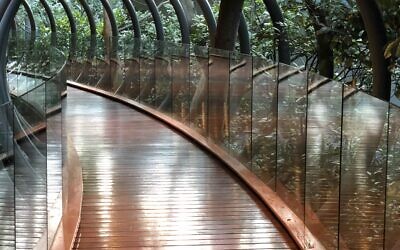
We stayed at the Saxon in the opulent Sandhurst district with houses every bit as large as the hotel (which itself used to be a house).
Get The Jewish News Daily Edition by email and never miss our top stories Free Sign Up
Like the homes surrounding it, it is hidden behind 10ft walls, but the solid electronic gates slide open to reveal a property that is rather more country estate than city hotel. We had a light lunch on the terrace overlooking the pool and the 10 acres of beautiful gardens which even have a magical hidden skywalk leading to the villas. Manager George Cohen played Jewish geography with us and it turns out that he’s been to north London and we have several mutual acquaintances. He also told us about the many Jewish weddings and Friday night dinners that have been hosted at the hotel.
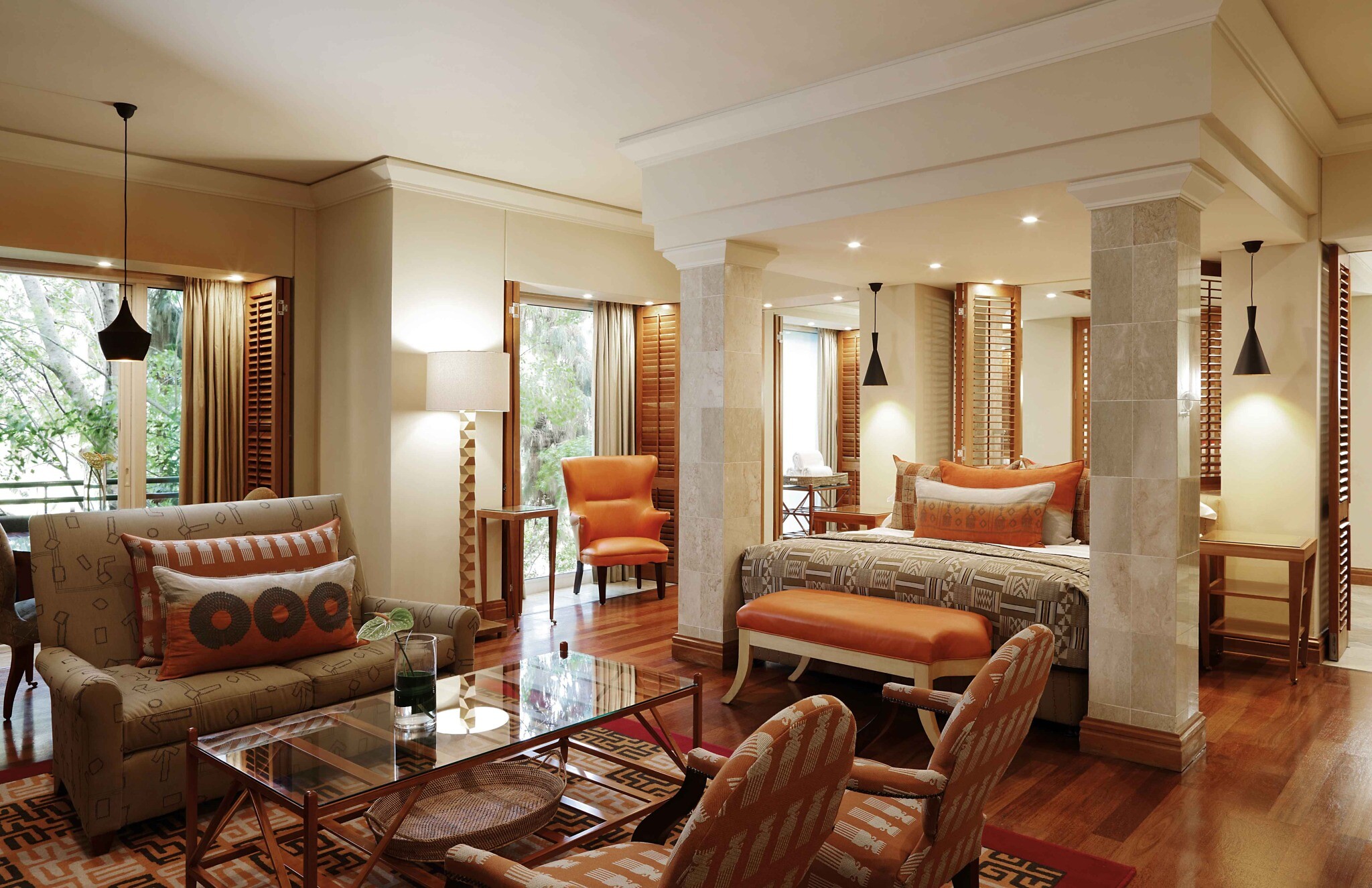
The bedrooms at the Saxon are vast – and I do mean vast! The sleeping area with superking-sized bed is sandwiched between a grandiose lounge and a magnificent bathroom, all open plan with high ceilings, lots of light wood and African-style contemporary décor. I have never stayed in a larger, more luxurious, better-appointed bedroom and bathroom. Plug sockets English ones!) in all the right places, lighting up to scratch, pads and pens aplenty, every possible amenity within reach wherever you are – even a black makeup flannel behind the sink – plus a luxury range of own-brand Soul by Saxon toiletries.
The reception area with its double sweeping staircase and domed glass ceiling is light, warm and welcoming, opening onto a lounge area where afternoon tea is clearly a thing. The service is impeccable and makes everyone feel like a VIP. No wonder so many real VIPs have chosen to stay here, including Nelson Mandela who checked in after he left Robben island and it was here that he wrote Long Walk to Freedom. The suite in which he stayed now bears his name.
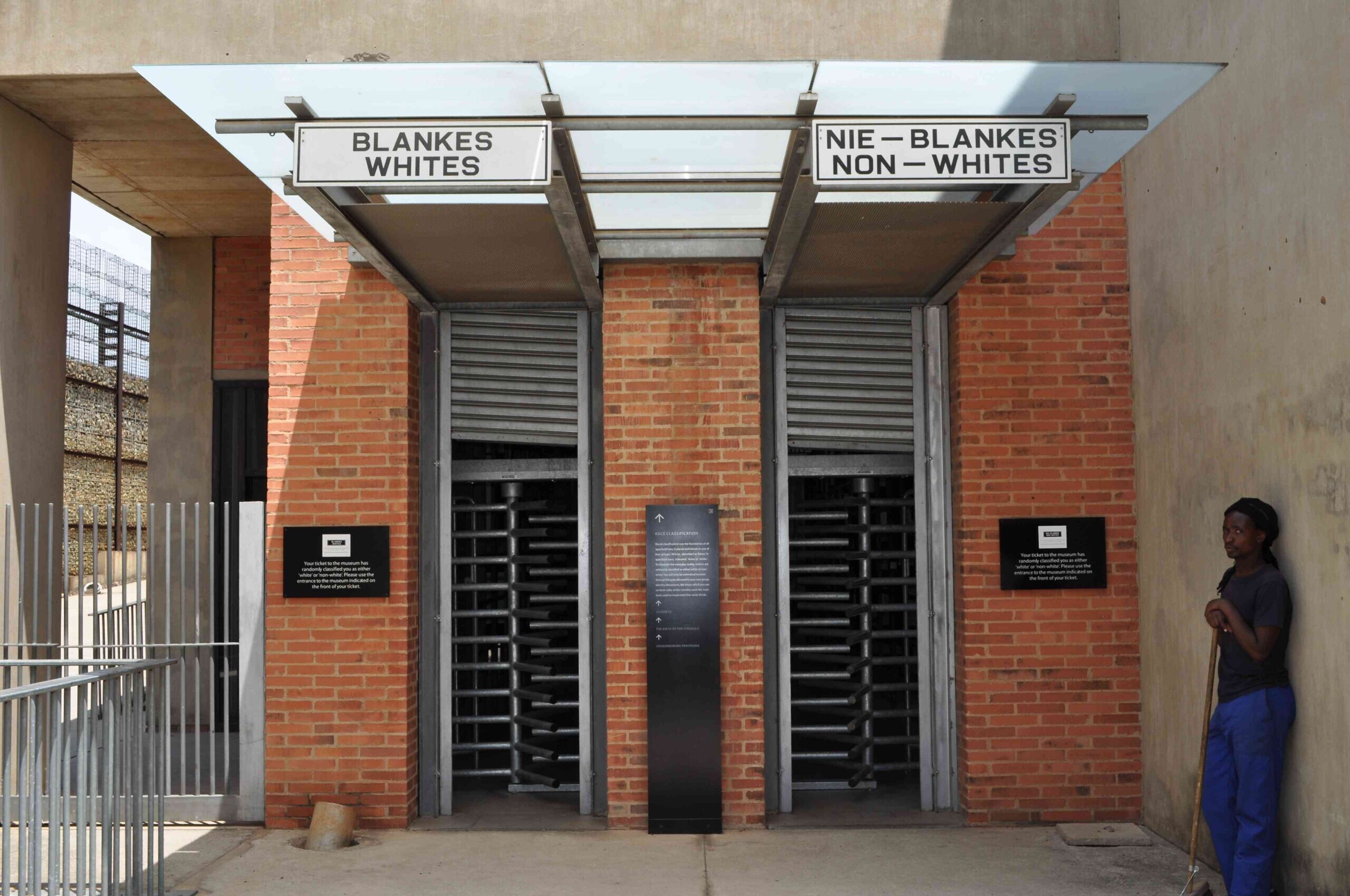
Leon was ours for the day and drove us to the Apartheid Museum where we were greeted with the stark whites/non-whites entrances. This is a highly informative, deeply harrowing museum that chronicles, in black and white (pun intended), the story of 20th century South Africa and the apartheid years. It was with the understanding gained from this that we embarked on a full-day tour with our guide Jacob.
He drove us around the many districts of Johannesburg, pointing out areas that were previously exclusively white, where blacks were only allowed to enter with a work permit, and which are now exclusively black. We saw prestigious schools in expansive grounds that for decades were attended only by white children and are now educating black children too.
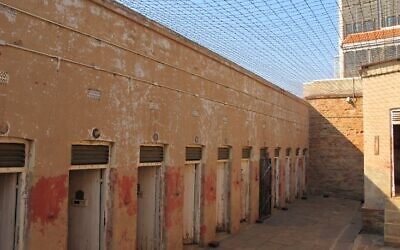
We spent nearly three hours at Constitution Hill, where blacks, white political activists and even women were incarcerated in communal cells that were overcrowded, rife with disease and often governed by gangs. We saw tiny isolation cells with barely room to lie down, and the large, relatively luxurious cell where Mandela spent many years before being moved to Robben Island.
Jacob drove us to Soweto, the collection of townships that was created in the 1930s when the government started separating blacks from whites. Home to more than two million people, many of whom live in single-room corrugated iron dwellings, residents do now have access to clean water, sanitation facilities and electricity. Soweto hit the headlines in 1976 when there were serious riots sparked by a ruling that Afrikaans be used in schools there, and again in 2010 when it hosted the FIFA World cup final.
It’s not all slums in Soweto. Nelson Mandela had a home in the busy, properly formed Orlando West township, where he settled in 1946 with his first wife Evelyn and then lived with Winnie. It is now a museum. Next door lives Lerato, whose grandmother formerly owned the house. When the police were banging on Mandela’s door, he would jump over the fence and hide in her house. Lerato is turning the property into an AirBnB, so you too can be Mandela’s neighbour. Yet in truth you are Mandela’s neighbour wherever you are in Johannesburg, for the city is an ode to the man responsible for ending the apartheid regime. From the streets, highways and properties named after him to the museums, galleries and tours that tell his story, you cannot spend time in the city without feeling close to and in awe of the man known in South Africa as Madiba, which means father.
WHERE WE ATE
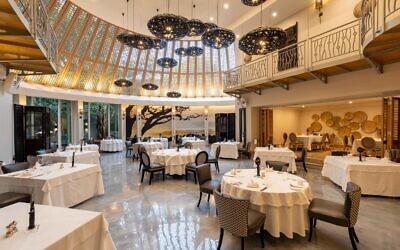
Qunu at the Saxon hotel, named for the rural area in which Mandela grew up. The finest of contemporary fine dining with classics such as salmon gravadlax, steak Diane and crepes Suzette alongside creative dishes including foie gras mousse with Cointreau macerated berries, seared loin of venison with pistachio crust, and wagyu beef with cauliflower puree and whipped bone marrow. The Saxon torte is a chocolate lover’s paradise. There is a full vegan menu.
Marble on the top floor of a building in the hip Rosebank district. With great views and a super swanky wooden interior it’s all about the South African tradition of cooking on fire – not just meat but also fish, vegetables and bread. Super food, super atmosphere, super prices! Plus of course great wine.
Accommodation at the Saxon hotel starts at 11,200 rands (£510) per night www.saxon.co.za
We were chauffeured by Leon sherffeurscharter@gmail.com
We toured with Explore Joburg info.explorejoburg@gmail.com
Bespoke Kosher Travel can arrange trips to South Africa www.bespokekoshertravel.com

Thank you for helping to make Jewish News the leading source of news and opinion for the UK Jewish community. Today we're asking for your invaluable help to continue putting our community first in everything we do.
For as little as £5 a month you can help sustain the vital work we do in celebrating and standing up for Jewish life in Britain.
Jewish News holds our community together and keeps us connected. Like a synagogue, it’s where people turn to feel part of something bigger. It also proudly shows the rest of Britain the vibrancy and rich culture of modern Jewish life.
You can make a quick and easy one-off or monthly contribution of £5, £10, £20 or any other sum you’re comfortable with.
100% of your donation will help us continue celebrating our community, in all its dynamic diversity...
Engaging
Being a community platform means so much more than producing a newspaper and website. One of our proudest roles is media partnering with our invaluable charities to amplify the outstanding work they do to help us all.
Celebrating
There’s no shortage of oys in the world but Jewish News takes every opportunity to celebrate the joys too, through projects like Night of Heroes, 40 Under 40 and other compelling countdowns that make the community kvell with pride.
Pioneering
In the first collaboration between media outlets from different faiths, Jewish News worked with British Muslim TV and Church Times to produce a list of young activists leading the way on interfaith understanding.
Campaigning
Royal Mail issued a stamp honouring Holocaust hero Sir Nicholas Winton after a Jewish News campaign attracted more than 100,000 backers. Jewish Newsalso produces special editions of the paper highlighting pressing issues including mental health and Holocaust remembrance.
Easy access
In an age when news is readily accessible, Jewish News provides high-quality content free online and offline, removing any financial barriers to connecting people.
Voice of our community to wider society
The Jewish News team regularly appears on TV, radio and on the pages of the national press to comment on stories about the Jewish community. Easy access to the paper on the streets of London also means Jewish News provides an invaluable window into the community for the country at large.
We hope you agree all this is worth preserving.
-
By Brigit Grant
-
By Laurent Vaughan - Senior Associate (Bishop & Sewell Solicitors)
-
By Laurent Vaughan - Senior Associate (Bishop & Sewell Solicitors)
-
By Laurent Vaughan - Senior Associate (Bishop & Sewell Solicitors)
-
By Laurent Vaughan - Senior Associate (Bishop & Sewell Solicitors)






















